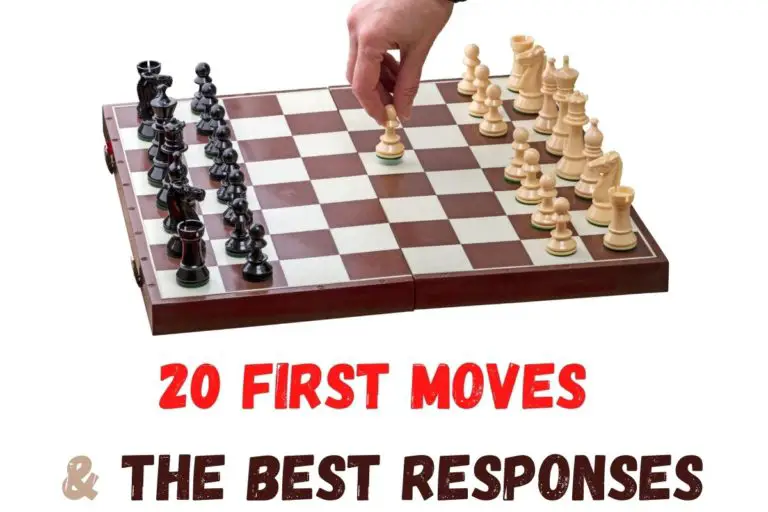Become a Chess Coach (How? Where? Minimum Requirement?)
⭐⭐⭐ Take 12 minutes to read and improve your chess game ➡️ : This article was first published on, and is Copyright of Chessquestions.com
Do you love chess? Do you enjoy teaching it to others? If so, there are many benefits that come with becoming a chess coach. Chess is one of the most popular games in the world, with more than 500 million people playing worldwide with a large amount looking for lessons! Becoming a good chess coach will require some work, but we’ll discuss all the steps below!
To become a chess coach you should have a provable high ability and an official FIDE rating as reference. Good business acumen and an ability to market yourself as a chess coach will be helpful in letting the world know you are available and gaining your first student.
Do you want to teach others and enjoy the satisfaction of seeing your students improve their chess game? If so, then becoming a chess coach is the perfect career for you. I will discuss what it takes to become a successful coach. We will cover requirements for teaching as well as how to impart your chess knowledge for the benefit, whether that be in chess classes or one to one tutoring.
Whether online or offline, there are many ways that someone can make money teaching people how to play this fascinating game!
This article has been written by Ranveer Mohite a 2277 Fide rated chess professional who offers limited chess coaching sessions. The article is therefore written with a wealth of experience of just what it takes.
Becoming a Chess Coach is not an Easy Decision.
It takes time and effort to learn how to play the game, let alone teach it! But don’t worry, I’m here to help you find all of the information you need in order to become a successful teacher.
In this blog post, I will explain what is required for becoming an official chess teacher and offer active training; the steps that should be taken so that your students have a good learning experience; how to advertise your services properly; and where best to look for new business opportunities. You’re one move closer!
There are no strict rules to teach chess. But there is one minimum requirement to become a chess coach
It is not unreasonable to suggest that even if you know the basics of playing chess that you can teach and instruct someone who has no knowledge of the game whatsoever on a friendly, helpful basis. but if you are going to market yourself as a coach and charge for your services with the promise of increasing your student’s chess abilities, then you really should be able to play the game to a very reasonable standard as a minimum.
You must know how to play the game of chess in order to teach it.
The higher your skill level, the more concepts you understand and the more you can teach. This also means you should constantly keep improving your playing strength to teach more advanced students tactical training and strategies.
But even if you have basic chess skills, you can teach students up to a certain level – like beginners who don’t know the rules of the game.
To become a chess coach, be a player first. This is the only minimum requirement to be able to teach and provide training games.
Elo Rating – This isn’t a necessary requirement and there are quite a few unrated players who also coach. But it makes it easier for people to believe that you play chess and have the basic skill.
Extra skills you will need to learn to become a successful chess coach
Knowing about chess, being able to play, and even being a chess master does not mean you will automatically become a great teacher and provide a good user experience. Despite what we have said about being able to play the game, you will see in sports like Tennis or Golf that the best coaches are not the most skilled in competition, but they are great teachers who communicate well and are able to pass on their knowledge to improve their student’s overall ability.
Communication skills
As much as it’s important to be a good player, one must also be able to communicate their knowledge with the students as a personal chess coach. Usually, this is easier than developing your chess skills. We also talked about this in our article on ‘Are chess coaches Worth it?’.
A lot of grandmasters have difficulty teaching 4-5-year-olds. This is because they often don’t know how to talk in a way the kids would understand at this chess level. While on the other hand, an intermediate-level player who’s good with kids would be a better teacher. Why does this happen? The difference lies in communication skills and the ability to ‘teach’ or ‘coach’., chess tactics and impart personal experience. Not everyone has ‘it’.
This also shows why a good player may not necessarily be a good coach. So don’t feel disheartened if you think that all students will prefer grandmaster-level coaches. It isn’t the reality and stronger coaches usually work with stronger players, not beginners. There’s a market for everything.
Patience
There is a difference in the strength of a coach and that of a student. As a result of this, what comes naturally to a coach in a chess game, may not be second nature to their student. This causes a disconnect. One party believes it’s easy while the other barely understands the concept.
In such cases, it’s important for the coach to be fully aware and understand the lack of ability in his subject, displaying patience and encouragement while teaching even at the most basic level.
Giving the solution quickly and without explanation as to ‘why’, won’t help the student to develop their thinking ability.
Patience also means having faith in the long-term process. I’ve often seen students work with top coaches yet they lose rating points. But after some days, these students show progress faster than their peers.
It’s important to know that progress in chess is a journey with a lot of obstacles in the way. As a coach, you must have faith in your training methods and be patient with your student, before you see any improvement.
Being a support system for students
There will be unavoidable obstacles in your student’s journey to become a stronger player. In such cases, the role of a good coach is to motivate their student while being a support system for them. Giving suggestions from your own experience is a good idea in such cases.
Help your students first
The right mindset is important. Your goal should be to help the student become a better player in the game of chess. Often I see a lot of chess coaches being blinded by money. They are fearful of exposing a student to another coach.
This not only harms the student but also damages the reputation of the coach in the long run. Also, you are doing a big disservice to the chess world.
Instead, operate from a mindset of helping your student thrive. This will help them and build your reputation further.
It’s similar to running a successful business. Solve the problems first. Only then you can expect to earn from it. After all, being a chess coach is indeed your business. Give it the best chance you possibly can.
You Can Become A Chess Coach Independently or Through Associations or Websites.
If you want to become an independent coach, you will require a certain level of reputation and a name to be trusted and respected for the would-be students to part with cash for your services.
The benefit of being an independent coach is that, within reason, you are able to charge whatever rate you feel is suitable for you. You will have to do all of your own marketing and grow your business yourself.
With the backing of a respected name in the world of chess, it may be somewhat easier to build a client base, but there will be some criteria that have to be met to attain that respected backing
To Be A FIDE Chess Teacher
In order to be a FIDE chess teacher, you need to gain experience as a coach (sometimes even as a player) before you are accepted into the program. The benefit is that you get to learn the art of teaching chess from some of the best trainers in the world.
There are different titles you can apply for depending on your level. Each of them has different criteria. But the basic requirements include –
- Minimum elo criteria
- Coaching experience
For example, to be a FIDE Trainer, one has to be above 2300 elo and have a training experience of over 5 years.
For becoming a FIDE senior trainer, one has to have either a Grandmaster, International Master, FIDE Master or Women Grandmaster title and at least a 2450+ elo rating. This is the highest title a chess coach can attain.
There are other titles as well like FIDE Instructor, National Instructor and Developmental Instructor. Learn more about them on FIDE’s official page.
To be a Coach on Chess.com
You need to be a premium member first and foremost and have a verified account, which can be gained by providing photo identification to chess.com, along with a selfie. Ha Ha, I’m not joking.
If you are a titled player, there is a titled verification process to go through too.
In addition to some basic account settings requirements, having a history of being a helpful member of the chess community is a plus. Once all these areas are in place there remains an application process to go through.
Take a look at the full guide to become a coach on chess.com
Steps to ensure that your chess students have a good learning experience?
- Start with Solving Tactics – Tactics are an essential part of the game. A lot of coaches often use tactics as a warm-up routine before starting the main session. You too can incorporate it into your session plan.
- Explain Chess Concepts – During the training session, explain the concept so that your student understands what it is and how it can be applied. Showing 2-3 examples on the topic is often useful.
- Test their understanding – Give them a position to solve to see how well they have understood the concept. If they haven’t understood the concept, make them aware of how they should be approaching a position.
- Analyze their game – Go through their games and find their weaknesses. Show them where they made mistakes and how they can be fixed. If you see a certain pattern of mistakes being repeated, give them training exercises as homework to solve.
- Work on their mindset – Chess is psychological warfare. In some sessions, help them understand the role of being in the right mindset. Also, if they face psychological blocks, talk to them to see if you can help them out.
- Each Student is different – Every student is unique in the way they learn the game. You need to be strict with some of them, while others might understand better if you are gentle with them. Find out what works best for each student.
Expectations
- Work hours – As an independent chess coach, you can expect to have flexible work hours. You will be the one scheduling sessions on your terms. However, if you are working for an academy, there might be certain work hours you need to complete, based on your contract.
- Handling students – Some students can have many doubts, others might be mischievous. Some of them could be adults, while others can be kids. It depends on whom you want to work with. Be prepared to face the challenges while helping people become better at the game.
- Rates – Is chess coaching a lucrative job? It depends on various factors, some of which were discussed in ‘Can chess players make money?’. As a beginner, you won’t be able to earn much. However, as you gain playing and teaching skills, you should be able to charge more. But once again, I would like to emphasize that you keep your focus on helping your students. The money will follow when you make the chess world a better place.
How to advertise your coaching services?
Where can you find students? How to advertise your service as a coach?
Those who have already established themselves as coaches, don’t need a lot of marketing. The majority of their students will come from word of mouth. But if you are starting out your coaching career, marketing is extremely important. This is where having a business perspective helps.
Before we dive deep into this, understand that there is a market for everyone. A stronger player will usually prefer working with advanced-level students. Intermediate-level players often work with beginners. This will help you understand which market to target and how to advertise your services.
7 Killer Ways to Get Your Chess Coaching Business Up and Running
There are plenty of ways to get your business up and running, your name into the wider world and begin to attract and secure students for chess training.
Some methods will be easier that others, whilst some will be more attractive to you as a prospect than others too. The one thing that is certain, is the more work you put in at this stage, in one of these 7 ways to start chess coaching, the more chance you will have of getting sufficient client to begin a legitimate chess coaching business.
Don’t worry about the potential for earning, we will run a full guide to how much a chess coach can earn in another article.
1. chess.com
You can register yourself as a chess coach on this site. To get started all you need to have is FIDE elo or rating approved by your national federation(like USCF). Also, fill out your profile describing your coaching service. Approval takes time – from 3 days to 3 weeks. But once you are approved, you will become a part of the Coach Directory of chess.com.
To show up higher in the directory, try to be more active on the platform. This could help you rank above other coaches and the chances of your profile getting clicked also increase.
To learn more about how to become a coach on chess.com, read their official guideline.
2. lichess.com
One can only become a coach on lichess if they are a titled player. Non-titled players cannot become coaches. To become a coach you have to fill out the title application form. Also, check out their coach page to know more.
3. Local Clubs and Remote Academies
Another place where you can start coaching is to apply for a position at clubs or academies. A lot of academies are often looking for talented coaches as they expand their presence. One benefit of working with an academy is that you get the opportunity to learn from other talented coaches. This way, you gain invaluable experience, upskill yourself while at the same time earning money.
Also, a lot of academies are looking for coaches who can work remotely given the post-pandemic world we live in. This means you can leverage the power of location independence and work in an academy that’s situated in another country. You can find such academies on social media or google them.
4. Social Media
Social media is an excellent way to advertise your service as a chess coach. In fact, a lot of coaches are using social media marketing to capture their target audience. You could consider using Instagram, Facebook, and other platforms to reach out to potential students. However, the two main platforms where chess players are spending most of their time are Youtube and Twitch. Consider using them as a way to advertise your chess coaching business, though it might take you time to get started and requires some initial investment.
5. Personal Website
If you are already an established coach, create a personal website & establish your own brand. Of course, growing this would take time, and getting traffic won’t be easy either, but it will help you sell chess-related products at your convenience. For instance, apart from your coaching package, you could sell courses, merchandise among many others. This will help you scale from a small coaching professional to a business.
6. Freelancing Platforms
These aren’t the best places to advertise your chess coaching services, but if you are looking for a side income or are new in the field, these platforms can help out. You can package your service on platforms like Freelancer, Upwork, PeoplePerHour, Fiverr etc. The biggest drawback is that you have to pay a certain commission to the platform.
7. Word of Mouth & Referrals
This is the best way to gain new students for your chess coaching business. Word of mouth and referrals (link to word of mouth section in are coaches worth it) also speak a lot about the quality of your work. But even if you are starting out, you can ask other coaches to refer you to any students that they cannot accept. They might charge a commission, but it will help you get started on your teaching journey.
Conclusion & A Sincere Request
I hope this article gave an in-depth answer to all your questions. Whether you will become a good chess coach or not depends on your willingness to work.
Before we conclude, there’s a sincere request I want to make. The chess coaching industry is currently plagued by some incompetent coaches who are more interested in minting money than teaching their students.
As a result, students often don’t see any improvement, lose their passion for the game and quit chess. Please do not follow that path as it hurts chess in the long run.
Instead, bring a lot of value to your students and help them become better. This way, more people will be attracted to the game and new opportunities will also open up for you. Your tiny contribution can actually make the chess world a better place.






